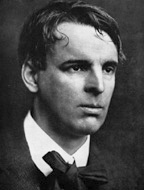|
William Butler Yeats
William Butler Yeats was born in Dublin, Ireland, in
1865, the son of a well-known Irish painter, John Butler
Yeats. He spent his childhood in County Sligo, where his
parents were raised, and in London. He returned to Dublin at
the age of fifteen to continue his education and study
painting, but quickly discovered he preferred poetry.
William Butler Yeats, 1923 Nobel Laureate in Literature.
A
host of good links, from the Nobel Prize Internet
Archive.
|

|
Biography: Born into the Anglo-Irish landowning class, Yeats
became involved with the Celtic Revival, a movement against the
cultural influences of English rule in Ireland during the Victorian
period, which sought to promote the spirit of Ireland's native
heritage. Though Yeats never learned Gaelic himself, his writing at
the turn of the century drew extensively from sources in Irish
mythology and folklore. Also a potent influence on his poetry was the
Irish revolutionary Maud Gonne, whom he met in 1889, a woman equally
famous for her passionate nationalist politics and her beauty. Though
she married another man in 1903 and grew apart from Yeats (and Yeats
himself was eventually married to another woman, Georgie Hyde Lees),
she remained a powerful figure in his poetry.
Yeats was deeply involved in politics in Ireland, and in the
twenties, despite Irish independence from England, his verse
reflected a pessimism about the political situation in his country
and the rest of Europe, paralleling the increasing conservativism of
his American counterparts in London, T.
S. Eliot and Ezra
Pound. His work after 1910 was strongly influenced by Pound,
becoming more modern in its concision and imagery, but Yeats never
abandoned his strict adherence to traditional verse forms. He had a
life-long interest in mysticism and the occult, which was off-putting
to some readers, but he remained uninhibited in advancing his
idiosyncratic philosophy, and his poetry continued to grow stronger
as he grew older. Elected a senator of the Irish Free Republic in
1922, he is remembered as an important cultural leader, as a major
playwright (he was one of the founders of the famous Abbey Theatre in
Dublin), and as one of the very greatest poets&emdash;in any
language&emdash;of the century. W. B. Yeats was awarded the Nobel
Prize in 1923 and died in 1939 at the age of 73.
High Talk:
Influences from the British Isles; this link includes a
discussion of Yeats' influence on poety of this century.
English IVHonnors: I'm
looking forward to your arrival on Wednesday; we will be meeting at
________. Enclosed is my new poem. I am curious to hear and learn of
your reaction to it.
The Second Coming (1921)
Turning and turning in the widening
gyre
The falcon cannot hear the falconer;
Things fall apart; the centre cannot
hold;
Mere anarchy is loosed upon the world,
The blood-dimmed tide is loosed, and
everywhere
The ceremony of innocence is drowned;
The best lack all conviction, while the
worst
Are full of passionate intensity.
Surely some revelation is at hand;
Surely the Second Coming is at hand.
The Second Coming! Hardly are those words
out
When a vast image out of Spiritus Mundi
Troubles my sight: somewhere in sands of the
desert
A shape with lion body and the head of a
man,
A gaze blank and pitiless as the sun,
Is moving its slow thighs, while all about
it
Reel shadows of the indignant desert
birds.
The darkness drops again; but now I
know
That twenty centuries of stony sleep
Were vexed to nightmare by a rocking
cradle,
And what rough beast, its hour come round at
last,
Slouches towards Bethlehem to be born?
Other Poems:
An Irish Airman Forsees His Death
I KNOW that I shall meet my fate
Somewhere among the clouds above;
Those that I fight I do not hate,
Those that I guard I do not love;
My country is Kiltartan Cross,
My countrymen Kiltartan's poor,
No likely end could bring them loss
Or leave them happier than before.
Nor law, nor duty bade me fight,
Nor public men, nor cheering crowds,
A lonely impulse of delight
Drove to this tummult in the clouds;
I balanced all, brought all to mind,
The years to come seemed waste of breath,
A waste of breath the years behind
In balance with this life, this death.
